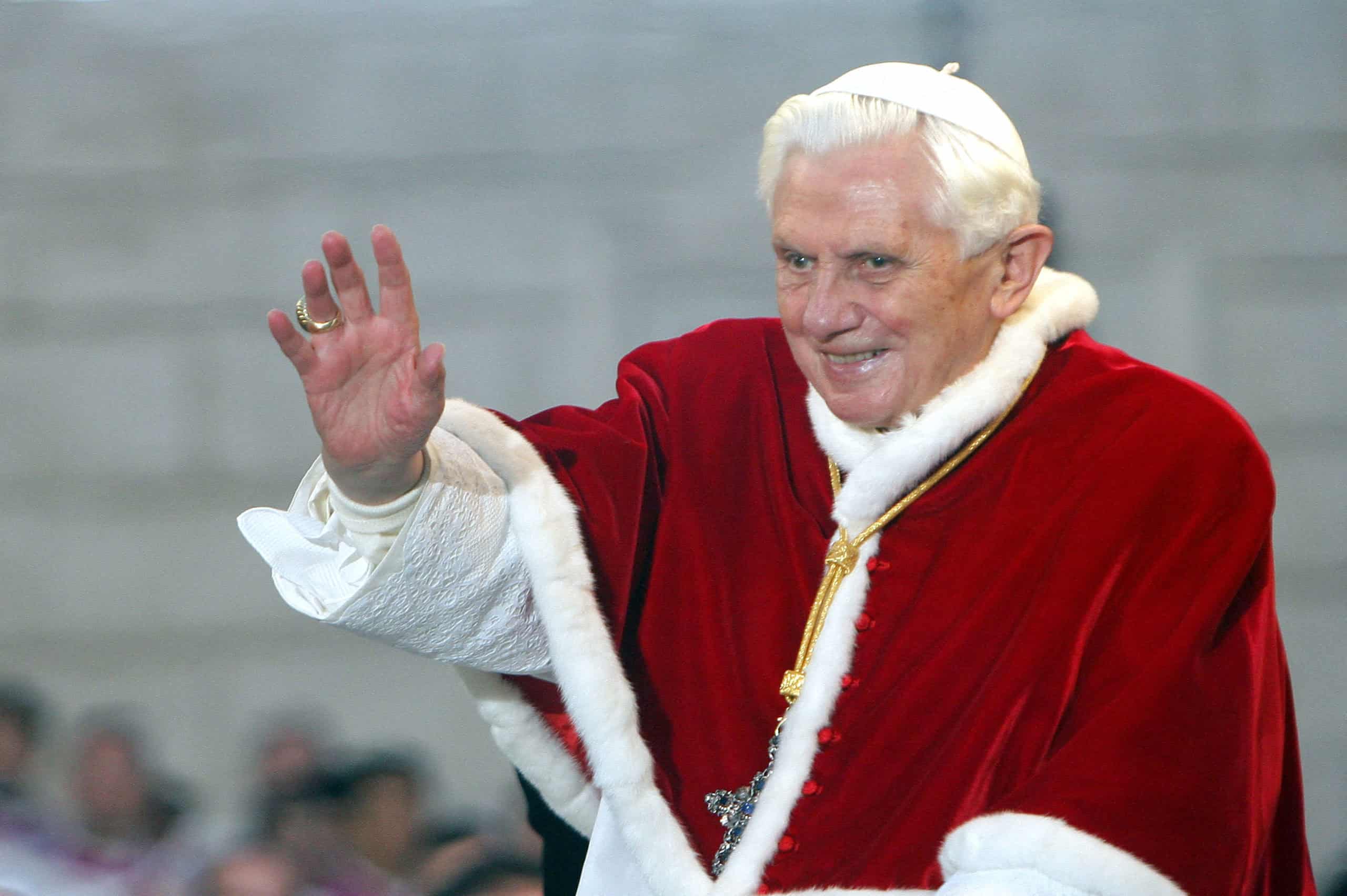Pope Emeritus Benedict XVI on Human Life, God, and Friendship With Jesus Christ

On Wednesday, concluding a regularly scheduled General Audience, Pope Francis asked for prayers for his predecessor Pope Emeritus Benedict XVI who is “very ill.”
“Remember him – he is very ill – asking the Lord to console him and sustain him in this witness of love for the Church, until the end,” he said.
Pope Benedict, at 95-years-old, is suffering “an aggravation of his health due to advancing age,” the Vatican press office confirmed. The office gave an update on Thursday saying that Benedict, “is absolutely lucid and alert and today, although his condition remains serious, the situation at the moment is stable.”
The retired pope was born Joseph Ratzinger on April 16, 1927, in Marktl, Germany. He was first ordained a Catholic priest in 1951 and became a professor at the University of Bonn in 1959.
Ratzinger was subsequently consecrated the Archbishop of Munich and Freising in 1977 and shortly thereafter was named a cardinal, one of the highest-ranking members of the clergy in the Catholic Church, in June 1977.
As a cardinal, Ratzinger served the Catholic Church as the Prefect of the Congregation for the Doctrine of the Faith, in effect the church’s lead theologian, from 1982 until 2005.
He is also a prolific writer, authoring more than 60 books, including his authoritative trilogy Jesus of Nazareth.
Following the death of Pope John Paul II in 2005, then-Cardinal Ratzinger was elected to the papacy on April 19, 2005, taking the name Pope Benedict XVI.
Citing his advanced age, Pope Benedict resigned the papacy on February 28, 2013, becoming the first pope to resign in nearly 600 years, and took the title of Pope Emeritus.
Pope Benedict XVI is now widely regarded as one of the greatest theologians that the Catholic Church has ever produced. Though he had adopted more liberal views in the early days of his priesthood, Benedict came to be one of the foremost defenders of conservative and traditional values of the last century.
He promoted the goodness and dignity of human life, argued against an advancing secularism in Western Countries, opposed relativism and its denial of objective truth, and upheld traditional Christian teachings on sexual morality.
Here is a small sampling of Pope Benedict XVI’s teachings.
On God
In his first encyclical letter Deus Caritas Est (translated God is Love), published on December 25, 2005, Pope Benedict wrote:
We have come to believe in God’s love: in these words the Christian can express the fundamental decision of his life. Being Christian is not the result of an ethical choice or a lofty idea, but the encounter with an event, a person, which gives life a new horizon and a decisive direction (emphasis in original).
He added, “In acknowledging the centrality of love, Christian faith has retained the core of Israel’s faith, while at the same time giving it new depth and breadth… Since God has first loved us (cf. 1 Jn 4:10), love is now no longer a mere ‘command’; it is the response to the gift of love with which God draws near to us.”
On Human Life
In his encyclical letter Caritas in Veritate (translated Charity in Truth) published on June 29, 2009, the pope wrote:
We must not underestimate the disturbing scenarios that threaten our future, or the powerful new instruments that the ‘culture of death’ has at its disposal. To the tragic and widespread scourge of abortion we may well have to add in the future — indeed it is already surreptiously [sic] present — the systematic eugenic programming of births.
At the other end of the spectrum, a pro-euthanasia mindset is making inroads as an equally damaging assertion of control over life that under certain circumstances is deemed no longer worth living.
Underlying these scenarios are cultural viewpoints that deny human dignity. These practices in turn foster a materialistic and mechanistic understanding of human life. Who could measure the negative effects of this kind of mentality for development?
On Relativism
In an address he gave on June 6, 2005, in Rome, the pope said the following regarding relativism’s denial of objective truth:
Today, a particularly insidious obstacle to the task of educating is the massive presence in our society and culture of that relativism which, recognizing nothing as definitive, leaves as the ultimate criterion only the self with its desires.
And under the semblance of freedom it becomes a prison for each one, for it separates people from one another, locking each person into his or her own “ego”.
With such a relativistic horizon, therefore, real education is not possible without the light of the truth; sooner or later, every person is in fact condemned to doubting in the goodness of his or her own life and the relationships of which it consists, the validity of his or her commitment to build with others something in common.
Consequently, it is clear that not only must we seek to get the better of relativism in our work of forming people, but we are also called to counter its destructive predominance in society and culture.
On Friendship with Jesus Christ
In his first homily given as pope, Benedict referred back to the words of Jesus Christ and Pope John Paul II, “Do not be afraid!” Benedict said:
Are we not perhaps all afraid in some way? If we let Christ enter fully into our lives, if we open ourselves totally to him, are we not afraid that He might take something away from us?
No! If we let Christ into our lives, we lose nothing, nothing, absolutely nothing of what makes life free, beautiful and great … I say to you, dear young people: Do not be afraid of Christ! He takes nothing away, and he gives you everything. When we give ourselves to him, we receive a hundredfold in return. Yes, open, open wide the doors to Christ – and you will find true life. Amen.
Photo from Reuters.
ABOUT THE AUTHOR
Zachary Mettler is a writer/analyst for the Daily Citizen at Focus on the Family. In his role, he writes about current political issues, U.S. history, political philosophy, and culture. Mettler earned his Bachelor’s degree from William Jessup University and is an alumnus of the Young Leaders Program at The Heritage Foundation. In addition to the Daily Citizen, his written pieces have appeared in the Daily Wire, the Washington Times, the Washington Examiner, Newsweek, Townhall, the Daily Signal, the Christian Post, Charisma News and other outlets.




